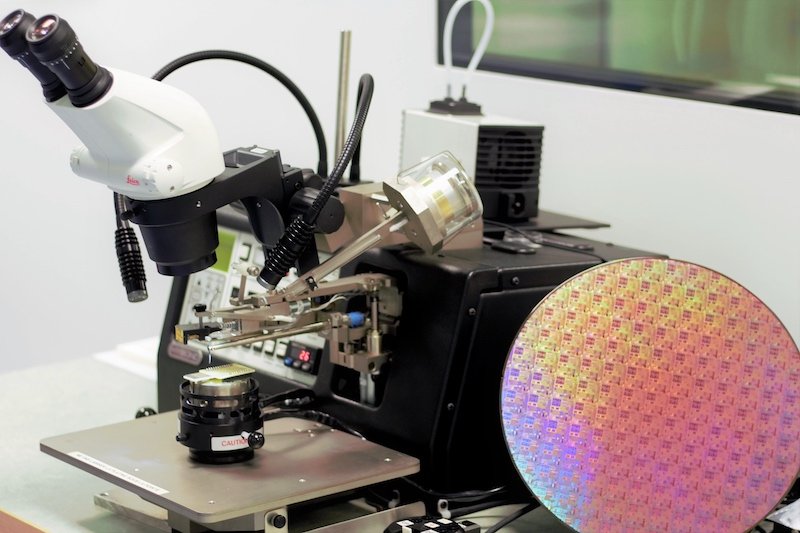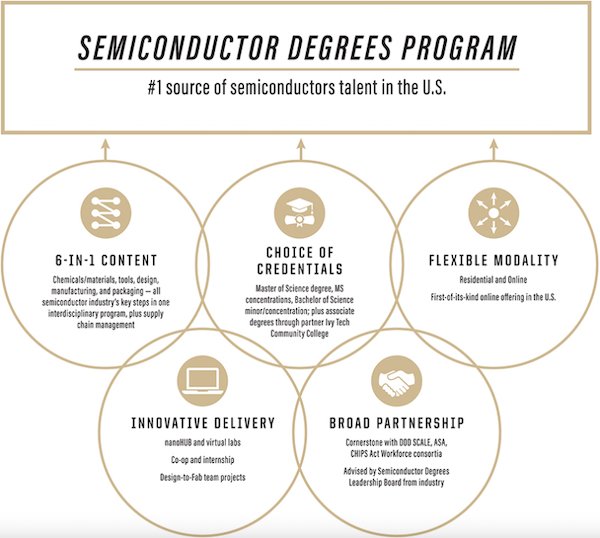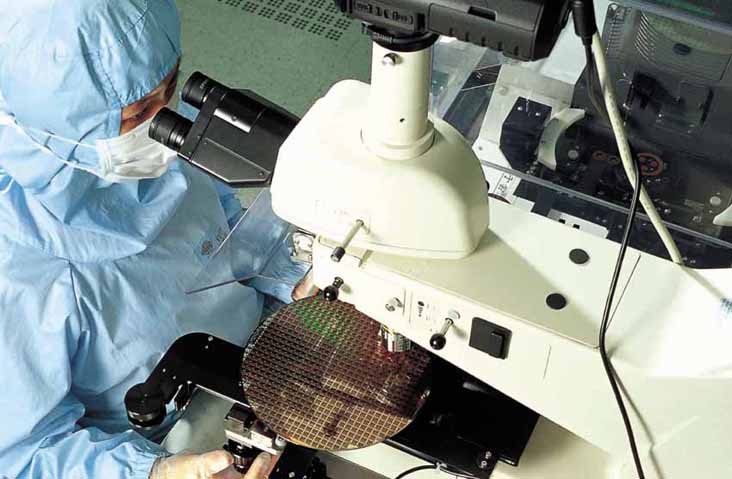The semiconductor talent deficit has soared since 2017, reaching a critical peak in 2020. At least 50,000 new engineers will need to enter the U.S. workforce in the next five years to keep up with chip demand.
This talent shortage is a global problem. China, Japan, South Korea, and Taiwan are struggling to reach ambitious digitalization goals due to outdated educational pathways. Reinventing semiconductor education might be one way to bring the long-standing chip shortage to an end.

Wire bonder machine next to a full 10-inch processed wafer. Image (modified) used courtesy of L N on Unsplash
Nipping the talent shortage in the bud, Purdue University, Indiana, has launched the first-ever Semiconductor Degrees Program (SDP), supported by a number of major chip suppliers, including TSMC, Intel, and NVIDIA.
Purdue Initiates Semiconductor Degrees
Most university programs offer semiconductor engineering as a part of postgraduate programs. Students must complete an advanced STEM field, such as applied physics, computer science, electrical engineering, or material science to pursue a degree in semiconductor engineering. The problem is that each of these fields deals with only certain aspects of chipmaking. Purdue's Semiconductor Degrees Program is designed with an interdisciplinary approach for a more holistic preparation for semiconductor manufacturing.

A Venn’s Diagram illustration of study modalities in the Semiconductor Degrees Program at Purdue. Image used courtesy of Kyle Redmond and Purdue University
SDP is an opportunity for STEM students interested in semiconductor engineering to participate in the manufacturing process. Original, flexible, and well-funded, the comprehensive interdisciplinary program brings on board top-notch academia from more than 50 globally recognized wide-spectrum research and faculty members.
Flexible Program Parameters
Students have the opportunity to study offline and online. They can enroll in on-campus education at the 186,000 sq ft. facility of the Birck Nanotechnology Center and access nanoHUB, an online interactive scientific networking and sharing community.

Birck Nanotechnology Center at Purdue Unversity, a home to labs for nanoelectronics, photonics, energy, micro-electromechanical systems, nano-biotechnology, and nanomanufacturing. Image used courtesy of Purdue University
Purdue SDP credentials are available as Master of Science and Bachelor of Science degrees as well as a series of stackable certificates that can be added to electronics engineering portfolios.
Purdue's SDP was largely inspired by the CHIPS for America Act and similar legislation aiming to revitalize domestic semiconductor manufacturing. Bipartisan support and acts of encouragement from industry associations and leaders paint an optimistic face for the future of the nation’s semiconductor engineering.
Students Design Their Own Curriculum
Purdue has based the SDP curriculum on a six-in-one plan, linking chemicals, materials, tools, design, manufacturing, and packaging together into a study program. Purdue asserts that the inclusion of logistics and supply chain management is also an important value proposition. As part of their studies, students need to consider supply chain issues early in the design, development, and manufacturing process.
Should they choose to enroll, candidates can design a study curriculum of their own in any of the subspecialties, including system-on-chip design, heterogeneous integration, and emerging devices. Purdue SDP also bakes in a variety of educational incentives: co-ops, internships, scholarships, and industry partnerships can better involve students in an end-to-end manufacturing process, from foundries to packaging.
Because students are given the chance to create their own curriculum, they will be actively designing classes and future job openings.
Purdue's SDP Attracts Industry Support
The program has already garnered strong support from industry leaders. Intel, NVIDIA, Qualcomm, IBM, Global Foundries, Applied Materials, Synopsys, Lattice Semiconductor, CMC Materials, SEMI, SIA (Semiconductor Industry Association), Nantero, Skywater, Efabless, and Cisco Systems are on the list of companies and associations that have offered words of endorsement and clear intentions to support Purdue students enrolling in the program.
One endorsement for SDP that bears significant value is TSMC, the world's largest chip manufacturer. TSMC has previously partnered with the Purdue School of Electrical and Computer Engineering on research and development for secure microelectronics systems.

TSMC employee in a clean room. Image used courtesy of Taiwan Semiconductor Manufacturing Company
While it may take several years for manufacturing facilities to feel the impact of more specialized grads, the SDP is designed for the long-term goals of preventing supply chain delays and decreasing reliance on foreign imports.
